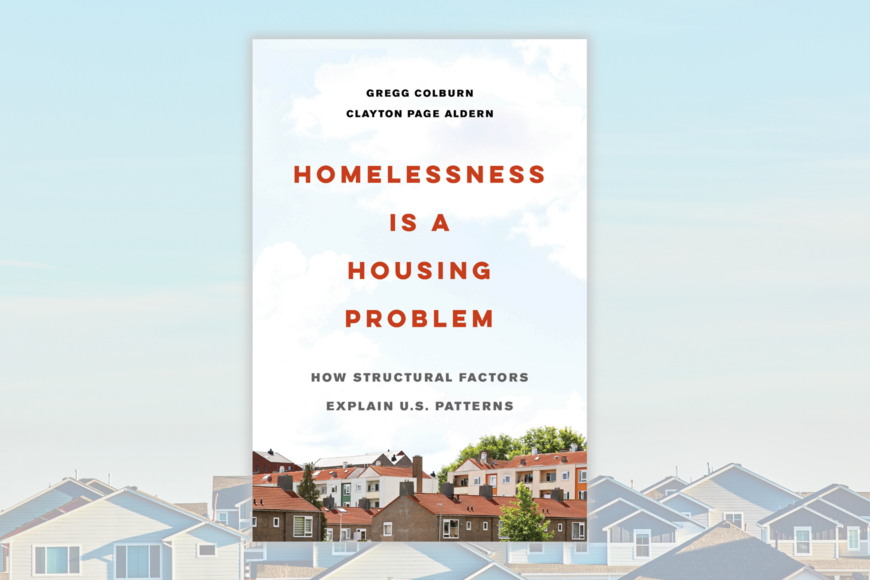Book Discussion: Homelessness is a Housing Problem

Join us for a conversation about the book Homelessness is a Housing Problem, by Gregg Colburn and Clayton Page Albern. This event is co-hosted by the South Burlington Affordable Housing Committee and the Library. Learn about and discuss the causes and effects of homelessness and housing instability in South Burlington and our region. The discussion will be moderated by Jess Hyman, Associate Director of the Champlain Valley Office of Economic Opportunity's Statewide Housing Advocacy Programs and by the Affordable Housing Committee. It will take place in the Library Community Room.
Want to join us for this conversation but can't make time for the entire book? Here are some resources to help you understand the issues:
- Brief video of co-author Gregg Colburn (7:45) https://www.youtube.com/watch?v=0APR7dt-uZ8
- Interview with co-author Gregg Colburn (1:06:42) https://www.lewis.ucla.edu/2023/11/29/61-homelessness-is-a-housing-problem-with-gregg-colburn-pathways-home-pt-1/
- A March 22 review of the book from the Seattle Times https://www.seattletimes.com/seattle-news/homeless/is-homelessness-a-housing-problem-two-seattle-experts-make-their-case-in-new-book/
- A brief presentation by Gregg Coluburn laying out the arguments in the book (PowerPoint slides): https://www.vermonttreasurer.gov/sites/treasurer/files/documents/Vermont_072423.pdf
Interested in digging deeper with the book? Read on:
It's in the title. In Homelessness is a Housing Problem, scholar Colburn and data journalist Albern seek to explain the substantial variation in rates of homelessness apparent in cities across the United States.
Using accessible statistics, the authors test a range of conventional beliefs about what drives the prevalence of homelessness in a given city—including mental illness, drug use, poverty, weather, generosity of public assistance, and low-income mobility—and find that none explain why, for example, rates are so much higher in Seattle than in Chicago. Instead, housing market conditions, such as the cost and availability of rental housing, offer a more convincing explanation.
Want local/regional context? Homelessness, housing instability, and housing availability in Vermont
The number of people experiencing homelessness in Vermont had been steadily increasing since 2020, with a rise in the number of families with children.
- Number of people, households, and children experiencing homelessness (2023 data, select Chittenden County to see local data). Detailed data from the 2023 Point in Time Count for Chittenden County (2024 data will be released later this spring)
- Households at risk of losing stable housing
- The National Low Income Housing Coalition’s annual report “The Gap: A Shortage of Affordable Homes” shows that the lowest-income renters in the U.S. face a shortage of 7.3 million affordable and available rental homes. As a result, nearly three-quarters of renters with extremely low incomes are severely cost-burdened, spending more than half their income on rent and accounting for nearly 70% of all severely cost-burdened renters in the U.S. As the report shows, just 34 affordable and available homes exist for every 100 renter households with extremely low incomes. The report shows that Vermont has a gap of 12,215 homes for households at or below extremely low income and an additional 12,349 gap for households at or below 50% average median income (AMI). See the full report.
- Snapshot of South Burlington’s housing landscape: (select South Burlington from drop-down list)
- Vermont Housing Needs Assessment (2020-2024, the next one will be released in May)
- What will it cost? Chris Donnelly of Champlain Housing Trust, in partnership with other members of the Housing & Homelessness Alliance of Vermont prepared this estimate of the state’s housing need and what it would cost to develop, repair, and sustain enough affordable homes for Vermonters. The report was presented to legislators this session and is the foundation of legislation (H. 829).
This book is available to borrow from the library. Book discussion reserve copies will be made available at the SBPL circulation desk on March 26.
Discussion will be hybrid: in-person at South Burlington Public Library and online via Zoom. To join us remotely: https://us02web.zoom.us/j/82538143783?pwd=UGpHa3NGNGg4OVZLbHlMNStLSldXUT09
Email sbplprograms@southburlingtonvt.gov or call 802-846-4140 if you have questions.
